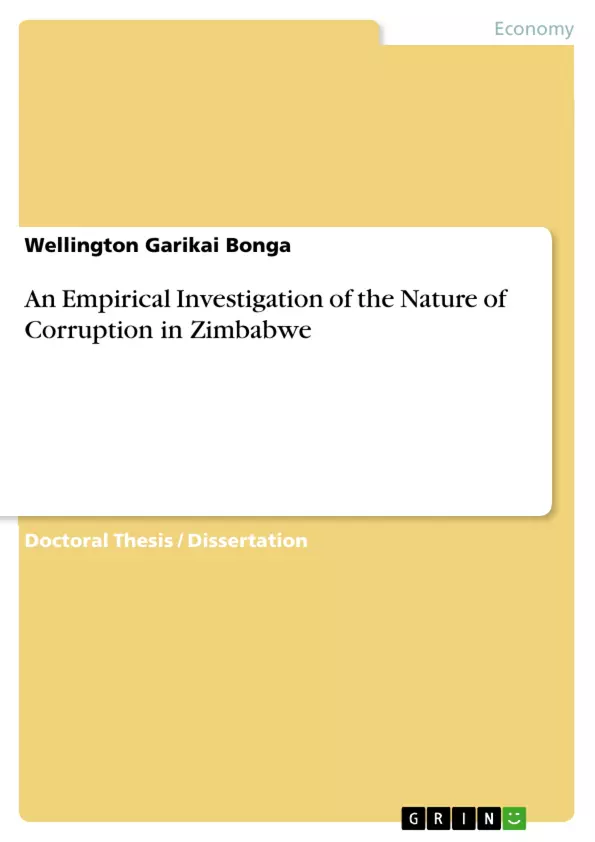Corruption has become one of the most notoriously persistent and progressively worsening social problems afflicting Zimbabwe today, and this is indisputable. Corruption is most unwanted in the society especially by those not involved, but it is blamed by those who practice it, just to divert attention. Important to note is that corruption is as old as the government, total elimination is impossible, but it should be barred to reach serious levels. This study seeks to empirically investigate the nature of corruption in Zimbabwe. The study uses a questionnaire approach to explore various dimensions of existing corruption and its impact on the society. A total of 835 participants countrywide correctly completed the questionnaire and electronically submitted. Included in this total are questionnaires that were hand distributed. The study utilises the weighted average approach to design various indices for policy derivation. On a scale of 1-10, the corruption index intensity was found to be 6.8 indicating serious levels of corruption in the economy. Nepotism/Favouritism/Cronysim and bribery/kickbacks/gifts have been found to be the major corruption forms in the society. Corruption networks have been confirmed to exist in society and commonly emanates from school and work; this is in line with the Social Learning theory. The study also found out that the Anti-Corruption body is ineffective to address corruption issues, and it is not autonomous from politics, and therefore concentrate on petty corruption rather than grand corruption. Determinants of corruption include poor remuneration, income inequality, job insecurity, greediness and economic instability. The best ways to harness corruption is to improve the political will, individual solutions and law enforcement.
Table of Contents
- CHAPTER ONE
- INTRODUCTION
- SIGNIFICANCE OF STUDY
- RESEARCH PROBLEMS
- RESEARCH QUESTIONS
- RESEARCH OBJECTIVES
- HYPOTHESIS
- SCOPE OF THE STUDY
- LIMITATIONS OF THE STUDY
- OUTLINE OF THE STUDY
- CHAPTER TWO
- BACKGROUND OF THE STUDY
- INTRODUCTION
- CONSEQUENCES OF CORRUPTION
- BASIC CORRUPTION MODEL
- CORRUPTION LEVELS IN AFRICA
- CORRUPTION LEVELS IN ZIMBABWE
- ZIMBABWE ANTICORRUPTION COMMISSION
- DEFINITIONS AND TYPES OF CORRUPTION
- SYSTEMIC CORRUPTION
- SPORADIC (INDIVIDUAL) CORRUPTION
- POLITICAL (GRAND) CORRUPTION
- PETTY CORRUPTION
- LEGAL AND MORAL CORRUPTION
- FORMS OF CORRUPTION
- BRIBERY
- GHOSTING
- NEPOTISM
- PATRONAGE
- BID-RIGGING
- GRAFT
- EMBEZZLEMENT
- BLACKMAILING
- CRONYISM
Objectives and Key Themes
This thesis aims to empirically investigate the nature of corruption in Zimbabwe, focusing on its various dimensions, impact on society, and potential solutions. The study utilizes a questionnaire approach, collecting data from 835 participants across Zimbabwe to develop indices and analyze corruption levels.
- The prevalence and intensity of corruption in Zimbabwe.
- The most prevalent forms of corruption and their underlying mechanisms.
- The role of social learning and networks in facilitating and perpetuating corruption.
- The effectiveness of anti-corruption measures and the factors influencing their success.
- The determinants of corruption and the most promising strategies for mitigating its impact.
Chapter Summaries
Chapter One introduces the study's context, significance, research problems, questions, objectives, hypothesis, scope, limitations, and outline. Chapter Two delves into the background of the study, exploring the consequences of corruption, a basic model of corruption, corruption levels in Africa and Zimbabwe, the Zimbabwe Anti-Corruption Commission, and the definition and types of corruption. This chapter also examines various forms of corruption, including bribery, ghosting, nepotism, patronage, bid-rigging, graft, embezzlement, blackmailing, and cronyism.
Keywords
The core keywords and focus topics of this thesis include corruption, Zimbabwe, empirical research, social learning theory, anti-corruption measures, determinants of corruption, and corruption mitigation strategies.
Frequently Asked Questions
What is the current intensity of corruption in Zimbabwe according to the study?
On a scale of 1-10, the corruption index intensity was found to be 6.8, indicating serious levels of corruption in the economy.
What are the most common forms of corruption in Zimbabwe?
The major forms identified are nepotism, favoritism, cronyism, and bribery (including kickbacks and gifts).
How does Social Learning Theory relate to corruption in Zimbabwe?
The study confirms that corruption networks often emanate from school and work environments, where individuals learn corrupt behaviors from their peers.
Is the Anti-Corruption body in Zimbabwe effective?
The study found the body to be ineffective and lacking autonomy from politics, often focusing on petty corruption rather than grand (political) corruption.
What are the primary determinants of corruption in the country?
Key factors include poor remuneration, income inequality, job insecurity, greed, and general economic instability.
What solutions are proposed to mitigate corruption?
The study suggests improving political will, implementing individual-level solutions, and strengthening law enforcement.
- Citar trabajo
- Wellington Garikai Bonga (Autor), 2014, An Empirical Investigation of the Nature of Corruption in Zimbabwe, Múnich, GRIN Verlag, https://www.grin.com/document/282390



